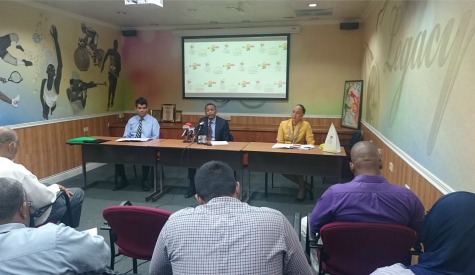 ESPN Caribbean begins its region wide coverage of the 2015 Pan American Games on July 10 at 7:30 pm ET with live coverage of the Opening Ceremony.
ESPN Caribbean begins its region wide coverage of the 2015 Pan American Games on July 10 at 7:30 pm ET with live coverage of the Opening Ceremony.
The event runs July 10 to 26 in Toronto, Ontario, Canada. Approximately 7,000 athletes from 41 countries will take part in 36 different sports competitions.
ESPN Caribbean’s agreement, in alliance with the Caribbean Association of National Olympic Committees (CANOC), includes English-language rights throughout the islands and on cruise ships sailing in the region.
“Our coverage of the Pan Am Games is an integral part of ESPN’s lead-up programming to Rio 2016,” said Tim Bunnell, senior vice-president of production, programming, marketing and ad sales.
“We know how important this event is to Caribbean fans and we will deliver a world-class production for our viewers. CANOC and ESPN will continue to bring locally relevant and prestigious sports content to the Caribbean region.”
“CANOC is proud of our continued association with ESPN and our role in the multi-platform distribution of the 2015 Pan AM Games in Toronto,” said Bernard Stewart, director and head of CANOC Broadcasting (CBI).
“Our combined effort to deliver to sports fans globally recognised events like the Pan Am games demonstrates our commitment to deliver unprecedented coverage of the journey of Caribbean athletes to showcase their talent in the Rio 2016 Olympics.”
ESPN will provide Caribbean fans with over 65 hours of event coverage on the ESPN Caribbean television network, along with more than 600 hours of live content streamed on ESPN Play, ESPN’s broadband platform. ESPN Play will also be complimentary to pay television subscribers from July 18 to 21.
ESPN’s live, English-language coverage of the Opening Ceremony is the first by a broadcaster in 30 years.
ESPN’s studio will be set in the heart of Toronto with the city’s emblematic skyscrapers as background. Coverage of the 17-day event will focus on track and field, diving, gymnastics, volleyball, women’s and men’s basketball, swimming, boxing and soccer.
Other exclusive ESPN Caribbean coverage includes updates with Shaka Hislop and Alexis Nunes and live, on-location event-related happenings with field reporter Toni Collins.
ESPN Caribbean’s social media channels will supplement the multimedia coverage, engaging fans with the latest news around the Games using the hashtag #PanAmXESPN.
![]()

 After seven weeks of uncertainty, Trinidad and Tobago’s 2012 Olympic Men’s 4x100m relay team received confirmation yesterday that they will be upgraded from bronze to silver, according to official information relayed by the International Olympic Committee (IOC).
After seven weeks of uncertainty, Trinidad and Tobago’s 2012 Olympic Men’s 4x100m relay team received confirmation yesterday that they will be upgraded from bronze to silver, according to official information relayed by the International Olympic Committee (IOC).  Port of Spain, July 3rd 2015 – On Friday 3rd July, the National Lotteries Control Board (NLCB) and the Trinidad and Tobago Olympic Committee (TTOC) revealed a landmark joint venture with the launch of “Going for Gold”, a brand new game which will raise funds for Trinidad and Tobago’s potential Olympians.
Port of Spain, July 3rd 2015 – On Friday 3rd July, the National Lotteries Control Board (NLCB) and the Trinidad and Tobago Olympic Committee (TTOC) revealed a landmark joint venture with the launch of “Going for Gold”, a brand new game which will raise funds for Trinidad and Tobago’s potential Olympians. TRINIDAD AND Tobago can expect to medal in both track and field events at this month’s Pan Am Games in Toronto, Canada. Yesterday, the National Association of Athletic Administrations (NAAA) released the final squad, which includes 20 male and 16 female athletes, as well as nine team officials.
TRINIDAD AND Tobago can expect to medal in both track and field events at this month’s Pan Am Games in Toronto, Canada. Yesterday, the National Association of Athletic Administrations (NAAA) released the final squad, which includes 20 male and 16 female athletes, as well as nine team officials.  Injured Thompson calls off 2015 campaign
Injured Thompson calls off 2015 campaign